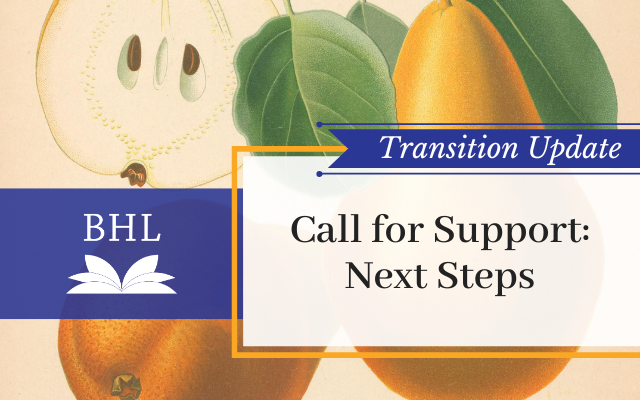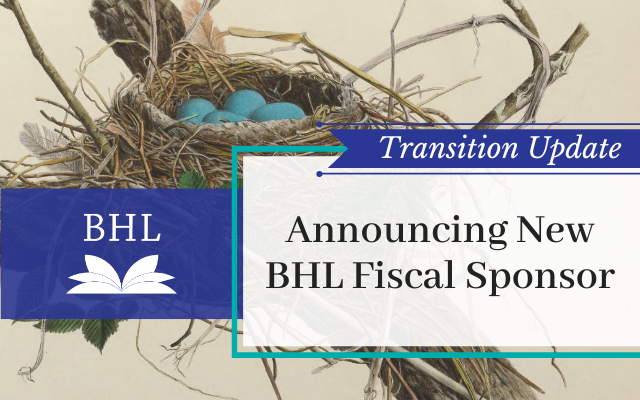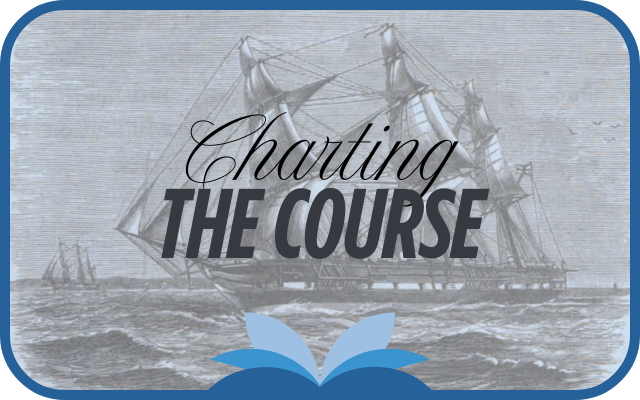BHL is honored to learn that we’ve been nominated for a Zedler Award by Wikimedia Deutschland. This award acknowledges contributions of individuals, groups or projects who have made contributions to free and open knowledge.
Continue reading
BHL Transition Update #5
From Call for Support to Next Steps

BHL Transition Update #4
Welcoming CLIR as BHL’s New Fiscal Sponsor

BHL Transition Update #3
Gaining Momentum

BHL is honored to learn that we’ve been nominated for a Zedler Award by Wikimedia Deutschland. This award acknowledges contributions of individuals, groups or projects who have made contributions to free and open knowledge.
On 11 April 2014, BHL Program Director Martin Kalfatovic gave a keynote address at the EOD Conference 2014. The conference, “EOD Conference 2014: Sustaining the networked future: use and reuse of digital content”, was held at the University of Innsbruck. The talk was attended by about 150 librarians from around the European Union. EOD (eBooks on Demand) is a EU funded project to provide for digitization on demand for consortia members and this conference marked the close of the multi-year project. The talk, entitled “Building for Demand: The Growth of the Biodiversity Heritage Library as Global Digital Library” can be found online here (and embedded below).
The Biodiversity Heritage Library (BHL), headquartered at the Smithsonian Libraries, welcomes Washington University Libraries (St. Louis, Missouri) as a new member. The 14th member of the BHL consortium, Washington University Libraries will help identify and digitize historical science literature from its collections and add these to the BHL’s online holdings, where all materials may be accessed free by the public. Founded in 1853, Washington University in St. Louis is a medium-sized independent research institution widely recognized for its teaching, research, patient care and service to society.
For the 2014 BHL Technical Meeting, the BHL Technical Advisory Group (TAG) met at the Missouri Botanical Garden (MBG) (2-3 April 2014) with William Ulate (Technical Director) and Martin Kalfatovic (BHL Program Director). Also joining the meeting were the BHL tech team based at MBG (Trish Rose-Sandler and Mike Lichtenberg), Carolyn Sheffield (BHL Program Manager), Bianca Crowley (BHL Collections Coordinator, by phone), and Connie Rinaldo (BHL Executive Committee Vice-Chair, by phone). The group met to review BHL technical development priorities, staffing and communications concerns, and related topics. Over the course of the two-day meeting, the group discussed priorities in terms of both core BHL technical operations as well as special projects that BHL participates in.
In early February, the National Evolutionary Synthesis Center (NESCent) hosted the EOL-BHL Research Sprint. NESCent, based in Durham, NC, is a non-profit science center supporting research in the evolutionary sciences. NESCent emphasizes an interdisciplinary approach to research, and so the idea behind the Sprint was to put together teams of programmers and life scientists to expose each other to questions and ways of thinking that they might not necessarily consider in their normal work.
BHL’s existence depends on the financial support of its patrons. Help us keep this free resource alive!
The Biodiversity Heritage Library (BHL) is the world’s largest open access digital library for biodiversity literature and archives. Headquartered at the Smithsonian Libraries and Archives in Washington, D.C., BHL operates as a worldwide consortium of natural history, botanical, research, and national libraries working together to digitize the natural history literature held in their collections and make it freely available for open access as part of a global “biodiversity community.”
Sign up to receive the latest news, content highlights, and promotions.
Subscribe NowSubscribe to the blog RSS feed to stay up-to-date on all the latest BHL posts.
Access RSS Feed